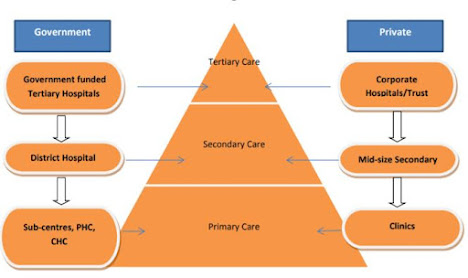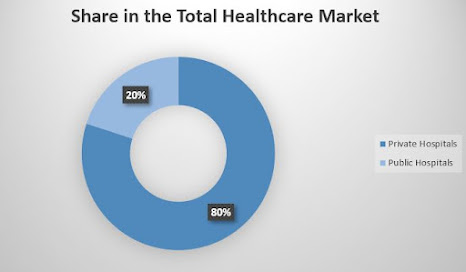Hospital sector - The upcoming gem of Healthcare Sector
Hospital sector - The upcoming gem of the Healthcare Sector
Twitter Handle: @shuchi_nahar
India has emerged as one of the fastest-growing emerging
economies over the last two decades, receiving large FDI inflows, which have
grown from USD 2.5 Billion in 2000-01 to USD 50 Billion in 2020-21. The
healthcare sector, in particular, has received heightened interest from
investors over the last few years.
Indian Government initiatives towards
development of hospital sector
With respect to pharmaceuticals, India can boost domestic
manufacturing, supported by recent Government schemes with performance-linked
incentives, as part of the Aatmanirbhar Bharat (Self-Reliant India)
initiative. Further, between 2018 and 2024, patents worth USD 251 Billion are
expected to expire globally, presenting a lucrative opportunity for the
country’s pharmaceutical sector, including the patent market. In addition to
generic drugs, there are investment opportunities in other segments of India’s
pharmaceutical sector, including over-the-counter drugs, vaccines, and contract
manufacturing and research.
The hospital's industry is the largest segment of the
healthcare services in the country which has proliferated from primary
healthcare centers to single and multi-specialty corporate hospitals over the
years. The healthcare facilities are delivered to the population through public
and private routes which are explained below.
India’s healthcare industry comprises
hospitals, medical devices and equipment, health insurance, clinical trials,
telemedicine, and medical tourism. The medical devices and equipment segment,
expansion of diagnostic and pathology centers as well as miniaturized
diagnostics have a high potential for growth. Medical Value Travel, especially
wellness tourism, also has bright prospects, given India’s inherent strengths
in alternative systems of medicine.
Indian government Policies and Scheme for
Healthcare Sector
Pradhan Mantri Surakshit Matritva Abhiyan (PMSMA)
Pradhan Mantri Swasthya Suraksha Yojana (PMSSY)
Mission Indradhanush
National Resource Centre for EHR Standards (NRCeS)
National Health Policy (NHP) Scheme
Ayushman Bharat
FDI in India’s Hospital Sector
India’s FDI regime has been liberalized extensively.
Currently, FDI is permitted up to 100% under the automatic route (i.e., the
non-resident investor or Indian company does not require approval from the
Government of India for the investment) in the hospital sector and in the
manufacture of medical devices. In the pharmaceutical sector,
FDI is permitted up to 100% in greenfield projects and 74% in brownfield
projects under the automatic route.
Need for development Hospital Sector
India which accounts for nearly a fifth of the world’s
population has 12 beds per 10,000 people mainly in urban areas with the number
being far lower in rural areas. India’s bed density not only falls far behind
the global median of 29 beds, it also lags that of other developing countries
such as Brazil (21 beds), Malaysia (19 beds), and Vietnam (26 beds).
Despite the uptick in Government spending and thrust on
increasing insurance coverage, the Government of India’s expenditure on
healthcare stood only at 1.4% of GDP in FY18. The continuing disparity of
healthcare spending between urban and rural areas has resulted in a sharp disparity
in healthcare availability across the country. The Government of India is
planning to increase public health spending to 2.5% of the Country’s GDP by
2025.
The public healthcare facilities in India have been
unable to scale adequately to serve the needs of the large population reaching
the interiors of the country has been another challenge. Additionally, several
of these facilities are understaffed, poorly equipped in terms of basic
infrastructure and equipment, and in need of enhanced quality standards and
protocols.
This unmet opportunity combined with strong fundamentals
has largely led to the private sector taking center stage in the healthcare landscape.
The late 1990s witnessed improvement in the economic conditions and made
private healthcare affordable to many Indians. These hospitals turned into
Centres of Excellence and over time, became the preferred choice for patients and
communities over Government hospitals.
Today, the healthcare
sector in India offers a potent mix of opportunities and challenges. The significant gap between ‘required’ and ‘actual’ healthcare infrastructure has
driven considerable investment over the years into assets like hospitals and
other facilities. Healthcare in India today provides corporations with a unique
opportunity for innovation, differentiation, and profits it has become a
preferred sector for strategic and financial investments.
Few of the Listed Companies in this space:
HCG
Narayana Hrudayalaya
Aster DM
KIMS
Apollo Hospital
Max Healthcare
We will be covering a few of the above-mentioned companies in the coming weeks.
Twitter Handle: @shuchi_nahar
Disclaimer: The information provided on Shuchi Nahar’s Weekend Blog is for educational purposes only. The articles may contain external links, references, and a compilation of various publicly available articles. Hence all the authors are given due credit for the same. All copyrights and trademarks of images belong to their respective owners and are used for Fair Educational Purpose only.










Metropolis is a diagnostic lab.
ReplyDeleteThanks for sharing informative information in this blog.
ReplyDeleteLooking for custom food labels for your business? Reach Sai Impression
I just learned a lot from this post and first things first, I’m going right now to work on my blog design, which I know isn’t too appealing.
ReplyDeletePcd Pharma Franchise Company in India
Top 50 Pcd Pharma Companies in India
Depending upon the physical and mental state of the patient; inpatient rehab, outpatient rehab or partial hospitalization program can be chosen for the treatment.
ReplyDeleteRehab Indianapolis
Thanks for sharing this one.
ReplyDeletePackaging and labelling solution providers in madurai
Kumar Hospital Sohana provides reliable, affordable, and quality medical care. With experienced doctors, emergency services, ICU facilities, and a clean environment, patients receive the best treatment and support.
ReplyDeleteBest hospital near me Mohali
Health checkup hospital in Sohana
Best doctor in Sohana
What an interesting and inspiring read! I really enjoyed learning about how the hospital sector is evolving and becoming an “upcoming gem” with so many opportunities for growth and improved patient care. Articles like this are great for highlighting the importance of quality healthcare infrastructure. In today’s world, having access to specialists — like trusted Pain Management Doctors in Richardson is also an important part of comprehensive care for patients dealing with chronic pain. Thanks for sharing such valuable insights
ReplyDeleteOnline GEM Registration allows businesses to sell products and services on the Government e-Marketplace portal. It is required for manufacturers, traders, and service providers who want to participate in government procurement. The registration process is online and requires basic business details, PAN card, bank account information, and contact details. Completing Online GEM Registration helps businesses access government tenders, receive direct orders, and ensure transparent transactions with government departments.
ReplyDeleteDarpan portal registration is essential for NGOs seeking government credibility and funding. At NGO Experts, I provide complete legal support to simplify the darpan portal registration process. I ensure accurate documentation, smooth filing, and timely approval, so NGOs can focus on their social mission with full compliance and confidence.
ReplyDelete